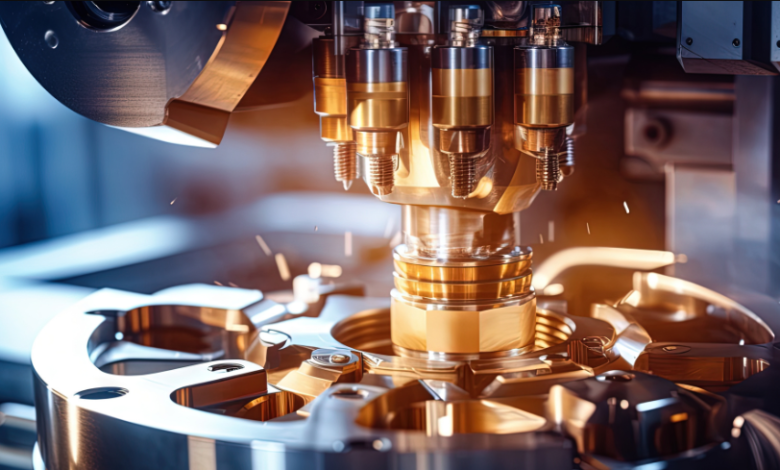Advancements in CNC Swiss Machineing

Overview of CNC Swiss Machineing
CNC swiss machineing has revolutionized the production of small and intricate components. Unlike conventional lathes, it supports the workpiece close to the cutting tool, allowing for minimal deflection and higher precision. This technology is widely used in industries that demand consistent quality, such as medical, aerospace, and electronics manufacturing.
Key Components of CNC Swiss Machineing
Sliding Headstock System
The sliding headstock ensures that the material moves smoothly while cutting tools operate precisely. This design significantly reduces vibration and tool deflection, which is critical when producing long, slender parts.
Multi-Axis Operation
Modern CNC swiss machines can perform simultaneous multi-axis machining. This allows for turning, drilling, and milling in a single setup, reducing the need for multiple machines and setups.
Automated Tool Handling
Advanced CNC swiss machines are equipped with automated tool changers. This feature minimizes human intervention and maintains continuous production while ensuring uniform quality across components.
Advantages of CNC Swiss Machineing
High Precision
The proximity of the guide bushing to the cutting tool reduces movement of the workpiece. This ensures that even the smallest details are machined with high accuracy, which is vital for sensitive applications.
Improved Efficiency
By combining several operations into one setup, CNC swiss machineing saves production time. This efficiency makes it ideal for high-volume manufacturing where speed and quality are equally important.
Material Versatility
CNC swiss machineing can handle a wide range of materials, including stainless steel, aluminum, brass, titanium, and advanced plastics. This flexibility allows manufacturers to produce parts for multiple industries without changing equipment.
Cost Benefits
Although the initial investment is significant, CNC swiss machineing reduces scrap and rework, making it a cost-effective solution in the long term. High precision machining reduces defective products, lowering overall manufacturing costs.
Selecting the Right CNC Swiss Machineing Provider
Experience Matters
Choosing a provider with extensive experience ensures optimized machining strategies, correct material handling, and reliable results for complex components.
Advanced Technology
Providers with up-to-date multi-axis machines and digital control systems can handle more intricate designs efficiently, ensuring both accuracy and productivity.
Quality Control
Reliable providers implement rigorous inspection procedures and adhere to strict tolerances, guaranteeing that every component meets required standards.
Flexibility in Production
A capable provider can manage urgent orders, adapt to design changes, and maintain quality, making them a valuable partner for ongoing projects.
See also: The Advantages of Custom Embroidered Under Armor Polo Shirts
Applications of CNC Swiss Machineing
Medical Equipment
CNC swiss machineing produces surgical instruments, implants, and diagnostic components requiring extremely tight tolerances and high precision.
Aerospace Industry
Small, lightweight, and precise components for engines and structural assemblies are manufactured using CNC swiss machineing to meet rigorous safety standards.
Automotive Parts
Fuel system components, engine parts, and other critical automotive pieces are produced with cnc swiss machineing, ensuring durability and accuracy.
Electronics Manufacturing
Connectors, housings, and other miniature components for electronics are fabricated with this method, allowing for reliable and consistent performance.
Emerging Trends in CNC Swiss Machineing
Automation Integration
Incorporating robotics and automation reduces manual intervention, improves production speed, and ensures consistent output for large-scale manufacturing.
Hybrid Manufacturing
Combining CNC swiss machineing with additive manufacturing techniques allows production of complex geometries and minimizes material waste.
Sustainable Production
Manufacturers are focusing on energy-efficient operations and eco-friendly materials to reduce environmental impact while maintaining high-quality output.
Digital Process Simulation
Digital twin technology and simulation software help optimize machining processes before production, reducing errors and enhancing efficiency.
Conclusion
CNC swiss machineing has become an essential technology in modern manufacturing, providing unmatched precision, efficiency, and flexibility. Its applications span medical, aerospace, automotive, and electronics industries, demonstrating its versatility. By choosing experienced providers with modern equipment and strong quality control, manufacturers can achieve consistent, high-quality results. The continuous evolution of CNC swiss machineing ensures that it remains a key enabler for precision manufacturing and innovation across industries.




